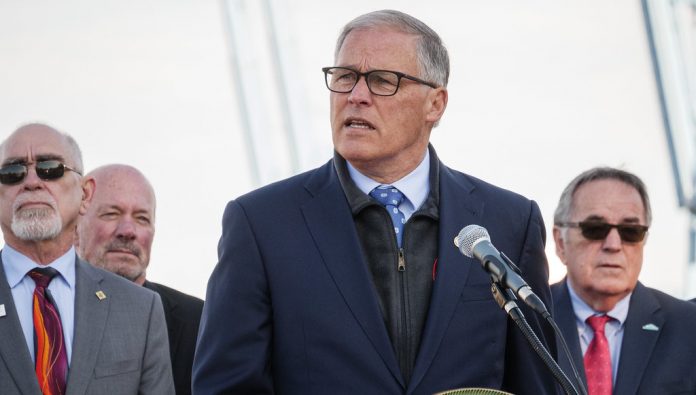By Cole Lauterbach
(The Center Square) – Leaning on the windfall of carbon auction credits that critics say pushes the state’s gas prices near nation-leading highs, Washington state Gov. Jay Inslee announced an ambitious increase in spending in his 2024 supplemental budget Monday.
Full details of Inslee’s proposal will be made public Wednesday.
Flanked by children and supporters in Seattle’s Miller Community Center gymnasium, Inslee outlined his agenda that includes a $200 utility bill credit for low-income households, more money to electrify buses, improve school ventilation, and other environmental expenditures. The Seattle Times reports Inslee wants to spend $941 million on fighting climate change, clean energy projects and transportation.
Much of the funding for the governor’s plan originates from the state’s carbon auction, which has amassed more than $1.5 billion from the sale of more than 39 million carbon allowances. Critics have assailed the program, saying it’s responsible for an extra 40-50 cents per gallon of gasoline born by commuters.
The plan supports legislation to phase out methane gas use for utilities. Inslee’s office says this would allow the state’s residents “to transition to zero-emission energy alternatives while maintaining grid reliability and affordability.”
Inslee’s administration intends to pursue linkage of Washington’s carbon auction with California and Quebec. The Department of Ecology requested legislation to do so in November but now has released model legislation.
“The potential bill would include changes to the statute that may be necessary to allow linkage, as well as potential housekeeping provisions to address other issues with the CCA,” the agency said in its announcement.
The premise of linking to the other two carbon auctions is seen with trepidation from in-state progressives who worry some provisions of Washington’s CCA would have to be rolled back to conform with the others.
The Environmental Justice Council, appointed by Inslee, wrote Department of Ecology Director Laura Watson in October with concerns that linkage would harm underprivileged Washingtonians and “diminish the ultimate success of Washington’s greenhouse gas reduction and air quality programs.”
At the earliest, Washington could operate as part of a linked market be late 2025.
Inslee also expressed support for a bill that would require the Utilities and Transportation Commission to “gather reporting of detailed pricing, profit margin, and transaction data held by fuel suppliers, refinery operators, and others in the transportation fuels supply chain.” His office said the UTC would report retail fuel prices and industry profits.
In answering a question from a member of the media about the carbon tax impacting those who can least afford it, Inslee brought up several of the children in attendance before answering the question by railing against fossil fuel companies for polluting the air and saying he wanted to do something about that.
“UnDivided” podcast journalist Brandi Kruse took to X, formerly known as Twitter, to accuse Inslee of bringing “up little kids to use as political pawns. Gross gross gross.”
The Center Square reached out to the Governor’s Office for a response to Kruse’s take.
“It was heartwarming,” Inslee spokesperson Mike Faulk emailed The Center Square.
Washington lawmakers reconvene on Jan. 8, 2024.
Cole Lauterbach is a managing editor for The Center Square covering the western United States. For more than a decade, Cole has produced award-winning content on both radio and television.
Originally published by The Center Square. Republished with permission.
To read more about Washington state’s gas taxes, click here.
To read more about Gov. Inslee’s environmental efforts, click here.


























